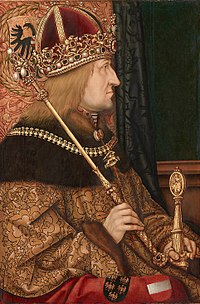Treaty of Soldin (1466)
[4] Frederick III, Holy Roman Emperor declared the treaty null and void in 1469,[5] but confirmed Brandenburg's claims in 1470.
Both sides were at times successful in convincing the Holy Roman Emperor of their respective view, and frequently, the conflict resulted in warfare.
[8] Also in 1457, the Hanseatic towns of Stralsund, Greifswald, Demmin and Anklam conclude an alliance directed against the Pomeranian dukes.
[10] This led Otto III and Wartislaw X to ally with the elector of Brandenburg on 6 September 1459, and with Denmark on 27 July 1462, both alliances were directed against Eric II.
[8] Many members of the House of Pomerania fell victim to this epidemic, including Otto III of Pomerania-Stettin,[11][12] who died without issue on 10 September 1464.
[1] Frederick III, Holy Roman Emperor initially rejected both the Pomeranian and the Brandenburgian claims, and considered Pomerania-Stettin as his personal property.
[1] The treaty included the following provisions: On 10 March, Wartislaw X of Pomerania and Frederick II of Brandenburg met in Gartz (Oder) to put the Pomeranian nobility under oath.
[3] On 8 May 1467, Mecklenburg and the Electorate of Saxony admonished the Pomeranian dukes to obey by the treaty and threatened them with an economical boycott, while the Hanseatic League, especially Lübeck, endorsed Stettin's refusal to pledge allegiance to Brandenburg.
[5] On 15 January, some Pomeranian nobles actually give the oath to the elector, but Stettin openly refuses again in May, and is again backed by the Hanseatic League.
[5] On 14 July 1469, the emperor issued a decree that nullified the treaty of Soldin, confirmed Pomerania's imperial immediacy and forbade Brandenburgian actions against the duchy.
[6] On 21 October 1469, Pomerania and Mecklenburg conclude a peace treaty, and oblige themselves to maintain neutrality in case one of them is at war with Brandenburg.
[6] On 6 August, the emperor forbade the Pomeranian dukes to hinder Brandenburg's appropriation of Pomerania-Stettin, and ordered the nobles to pledge allegiance to the elector.


